May 21, 2025 | 05:03 GMT +7
May 21, 2025 | 05:03 GMT +7
Hotline: 0913.378.918
May 21, 2025 | 05:03 GMT +7
Hotline: 0913.378.918
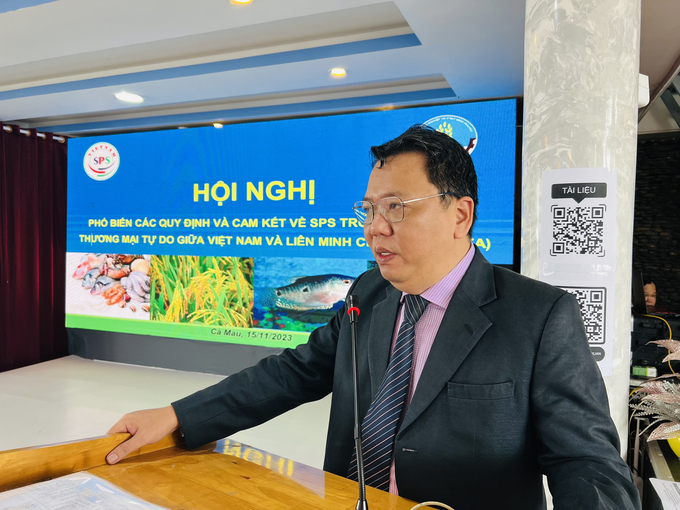
Dr. Ngo Xuan Nam - Deputy Director of SPS Vietnam Office shared at the Conference. Photo: Trong Linh.
The Vietnam SPS Office, in collaboration with the Ca Mau Provincial Department of Agriculture and Rural Development, orchestrated a conference aimed at disseminating regulations and commitments outlined in the Sanitary and Phytosanitary (SPS) provisions of the EU–Vietnam Free Trade Agreement (EVFTA). This collaborative effort underscores the commitment to adhering to international standards in the agricultural trade between Vietnam and the EU.
Mr. Ngo Xuan Nam, Deputy Director of the SPS Vietnam Office, underscored Vietnam's significant tenure of 16 years as a member of the World Trade Organization, participation in 19 free trade agreements (FTA), and the formalization of 16 official agreements, several of which are classified as new-generation FTAs.
The ratification of the EVFTA has proven instrumental in fostering a notable surge in the export of agricultural, forestry, and aquatic products from Vietnam to EU member countries. The consistent increase in the value of Vietnam's agricultural exports, surpassing 50 billion USD in the last two years, is projected to exceed 54 billion USD in 2023.
The pivotal Trade Agreement signed in August 2020 between Vietnam and the 27 EU member countries has catalyzed a robust two-way agricultural trade relationship. Key sectors such as aquaculture, rice, fruits, and various food products have experienced a substantial upswing in exports to the EU market. Concurrently, Vietnam has engaged in the importation of select animal and plant products from the EU market.
Vietnam's dedication to upholding rigorous standards is evident in its commitments to food safety and animal and plant health when exporting agricultural and food products to the EU market. Over the first 10 months of 2023, EU members have issued 103 notifications and draft opinions on safety measures for food and animal and plant health, exemplifying a comprehensive regulatory framework aimed at ensuring the integrity and safety of agricultural and food products imported into the EU market.
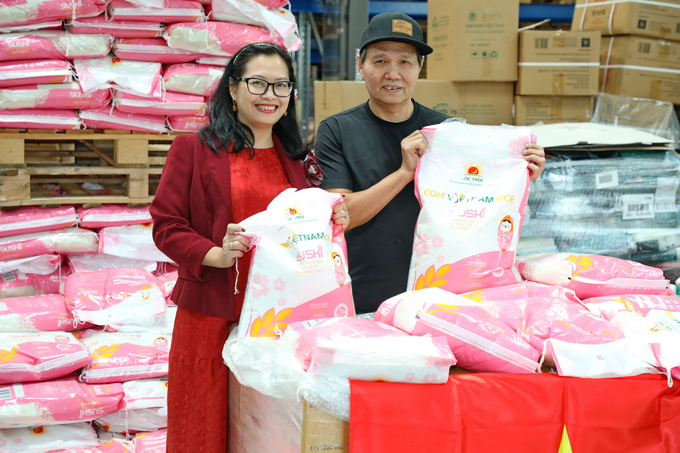
Vietnamese Loc Troi Rice entered the Austrian market for the first time, said Ms. Dinh Thi Hoang Yen, in charge of the Vietnam Trade Office in Austria. Enterprise rice brands gradually shape and create Vietnamese rice brands in the international market.
According to Mr. Nam, concerning the export of Vietnamese rice to the EU market, in recent years, under the guidance of the Ministry of Agriculture and Rural Development, along with local directives, especially from directly cultivating farmers, there have been no warnings about pesticide residues in any shipments of Vietnamese rice exported to the EU in the past two years. Thus, our rice quality fully meets the stringent requirements of this demanding market. Particularly, the EU market is one that imposes high standards, but we have been able to meet them.
During the conference, speakers shared regulations related to key seafood import markets such as the EU, China, the United States, Japan, Australia, and South Korea. Simultaneously, discussions focused on resolving difficulties and obstacles to ensure the sustainable development of the agricultural export industry.
Exporting goods to the EU market is facing challenges due to the high food safety standards of EU countries, particularly concerning imported seafood. Vietnamese seafood shipments have received warnings from EU authorities about the increasing trend of antibiotic residues. Additionally, Vietnam has not yet resolved the "yellow card" regarding illegal, unreported, and unregulated (IUU) fishing. Currently, only a few seafood processing facilities recognized by the EU meet the required standards, while others do not fully comply with EU regulations on ensuring food safety conditions.
Mr. Chau Cong Bang, Deputy Director of the Department of Agriculture and Rural Development of Ca Mau Province, stated that Ca Mau, an agriculture-focused province, has a strength in seafood production. Over the years, the province's seafood export turnover has consistently exceeded 1 billion USD, with the European market being the primary export destination. With a large shrimp farming area nationwide, covering nearly 300,000 hectares, and an annual output exceeding 220,000 tons, Ca Mau contributes nearly one-third to both the area and the seafood export turnover.
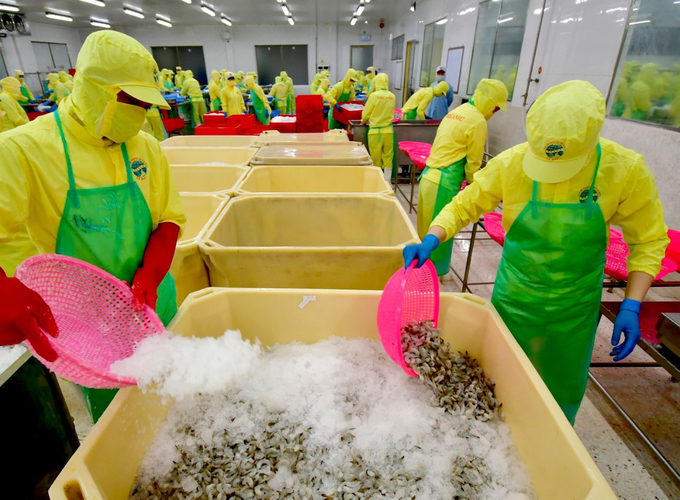
Seafood exports are still facing difficulties due to the general influence of the world situation. Photo: Trong Linh.
In recent years, the SPS Office has provided information related to the sanitary and phytosanitary conditions for exporting to the European market, including hygiene, animal health inspections, and plant inspections. Without a clear understanding of the regulations and import conditions of these markets, it is challenging to access them.
Assessing the current situation of Vietnam's seafood exports, relevant authorities need to consider issues related to management, cultivation organization, and quality control. Although certain products are selling well now, there is a risk of decline in the future. The first important step is to improve product quality. Despite the challenges, Vietnam's export situation has maintained growth, which is an encouraging sign.
According to Dr. Ngo Xuan Nam, the EU is a potential export market for many types of Vietnamese agricultural and aquatic products in the coming time due to the market's scale of over 500 million people and increasing demand for agricultural and food products. This is in line with the commitment to reduce most tariffs shortly under the Free Trade Agreement between Vietnam and the EU. However, the EU is also one of the most demanding markets with very high regulations on plant and animal health inspection, especially for agricultural and aquatic products.
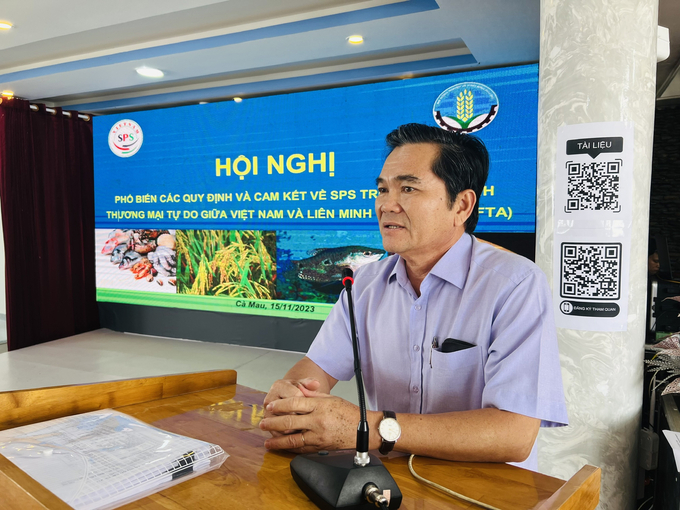
Mr. Chau Cong Bang, Deputy Director of the Department of Agriculture and Rural Development of Ca Mau province. Photo: Trong Linh.
Many experts also acknowledge that the trend in the EU market is to increase technical barriers while reducing tariff barriers. Evidence of this is that immediately after the EVFTA took effect, the EU issued many notifications related to regulations for farming and transporting aquatic animals. Regulations on animal health requirements for animal movements on land and egg incubation; rules for monitoring, exclusion programs, and disease-free status for some listed diseases and emerging diseases have been outlined.
In addition to government regulations, the EU market also imposes many standards and certifications from consumer associations, non-governmental organizations, and retailers that businesses must comply with, such as global standards for food safety established by the British Retail Consortium (BRC), sustainable aquaculture practices (ASC), and global good agricultural practices (GlobalGAP).
Translated by Linh Linh
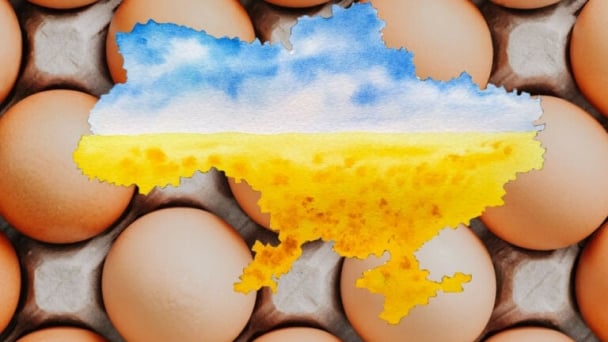
(VAN) Oliyar, a prominent Ukrainian oil and fat manufacturer, has revealed plans to build a farm for 2.3 million laying hens in the Lviv region. The additional production quantities promise to change the competitive landscape of the egg market of the Eastern Europe region.

(VAN) On May 15, Ministry of Agriculture and Environment of Vietnam hosted the 'Connecting Vietnam - Germany agricultural, forestry and fishery trade' seminar in Berlin, Germany.

(VAN) In the face of counterfeit and imitation products, Khanh Hoa Salanganes Nest Company hopes for the prompt completion of the legal framework, strict enforcement against violations, and protection of the bird’s nest brand.

(VAN) Japan's efforts to lower the price of rice through the release of its stockpile may finally be making some progress, albeit at a snail's pace.

(VAN) U.S. tariffs are not only a 'shock', but also an opportunity for Vietnamese businesses to renew their mindset toward comprehensive development.

(VAN) As Bac Giang lychee enters the harvest season, Minister Do Duc Duy expects that the fruit will contribute greatly to agricultural exports due to standardized production and deep processing.

(VAN) Consumers have shown a preference for free-range eggs, but those farming systems are more vulnerable to biosecurity risks like bird flu.